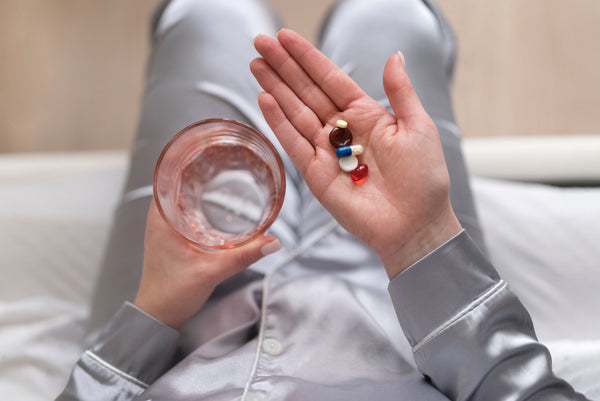What do you refer to as a "blood sugar level"? Why should you keep it under control? How do you keep it under control? If you have the above questions in mind, you’ve come to the right place. Below, we’ll talk about the importance of keeping blood sugar levels under control. But that’s not all! We've also included some fantastic healthcare supplements that can help you avoid diabetes. So, let’s begin.
What is Blood Sugar Level?
The blood glucose level, or sugar level, is the amount of sugar/glucose in your blood. The blood glucose levels are measured in millimoles per liter (mmol/l).
For healthy individuals, the ideal level lies between 4–5.4 mmol/l and up to 7.8 mmol/L post-meal. When you eat food, the blood sugar level is bound to increase, because your body converts the carbs in your food into sugar, which reaches your bloodstream. And when it does, the blood sugar level increases. However, when you rest for the night and wake up in the morning, your blood sugar levels decrease.
For people with type 1 or type 2 diabetes, the ideal blood sugar level before meals is 4 to 7 mmol/L. After meals, blood sugar levels should be under 9 mmol/L for type 1 diabetic patients and 8.5 mmol/L for type 2 diabetic patients.
Let’s now understand why it is vital to keep blood sugar levels under control.
Why is it Important to Maintain Blood Glucose Levels?
Controlling blood sugar levels is important even for a normal person. Especially for someone suffering from diabetes. It’s because uncontrolled sugar levels might lead to some severe complications.
If during the first year of diagnosis, you keep the blood sugar levels under control, you can save yourself from the risk of:
- Eye Issues
- Kidney Problems
- High Blood Pressure
- Heart Attack
- Strokes
- Heart Failure
In a nutshell, you need to maintain blood sugar levels to keep diabetes and the long-term complications of high or low sugar levels under control.
Now that you know why it is important to keep blood sugar under control, let’s learn how you can do that.
How to Control Blood Sugar Levels?
Here are a few ways in which you can control blood sugar levels.
1. Exercise Regularly
Regular exercise helps maintain a moderate weight and improves insulin sensitivity. With better insulin sensitivity, your body will be able to use the sugar in your blood more appropriately. So, make sure to exercise regularly. You can start with brisk walking and slow cycling. And then, you can slowly increase the exercise intensity.
2. Limit your Carb Intake
More carbs mean higher glucose (sugar) levels in your blood. And this is something you need to avoid. Research says that a low-carb diet helps people with type 2 diabetes manage their weight and blood sugar levels and reduces their chances of developing heart disease. When we say "low carb," it implies a diet with less than 130 g of carbs.
So, go for a low-carb diet. However, make sure your body gets at least the required amount of carbs a day.
3. Increase Fiber Intake
Fiber helps slow down sugar absorption and carb digestion. And this further slows down the rate of increase of blood sugar in the body. What’s more, a fiber-rich diet helps deal with type 1 diabetes and regulates your body’s ability to absorb sugar.
4. Consume Apple Cider Vinegar
Apple Cider Vinegar is a fantastic drink that is fermented apple juice. It’s quite good for your blood sugar levels. However, only a handful of apple cider vinegar products are reliable. And one such product is:
Apple Cider Vinegar from Wellbeing Nutrition
This Apple cider vinegar is made from Himalayan red and gold apples. It comes with 2x times "Mother". The term "mother" in this context refers to the good gut bacteria that developed in the ACV due to fermentation.
This golden drink might look a bit murky due to the presence of the "mother," but it has amazing health benefits. Here’s what makes it so good.
- Regulates Blood Sugar Level
- Protects you from the Risk of Diabetes
- Enhances Immunity
- Prevents Inflammation
- Relieves Cough and Sore Throat
- Helps with Weight Loss
- Promotes Heart Health
- Prevents Gas and Bloating
- Great Metabolism Booster
You can dilute 1 tbsp of ACV to 1 cup of water and drink regularly for the best results.
Another reliable Apple Cider Vinegar variant is:
Apple Cider Vinegar with Amla and Turmeric
Similar to the previous ACV variant, this one also helps regulate the blood sugar level, thereby protecting you from the risk of diabetes.
However, it also packs the goodness of turmeric, black pepper, amla, and cinnamon. All these ingredients exhibit antiviral, anti-inflammatory, anti-fungal, and antimicrobial properties that are quite useful to improve your digestion and immunity.
1. Consume Fruits and Vegetables
Some fruits and most vegetables have blood sugar-reducing properties. So, make sure to include 3-5 portions of fruits and vegetables in your diet. However, if you find including veggies in your diet hard, you can go for the effervescent Daily Greens.
Daily Greens
Daily Greens comes with the goodness of 39 farm-fresh & organic greens, fruits, and veggies, along with antioxidant-rich foods. These ingredients can help you:
- Maintain Stable Blood Sugar Levels
- Reduce Inflammation
- Protect Your Cognitive Functions
- Lose Weight
- Improve Bone Health
- Relieve Stress
- Detoxify your Body
How to Check Your Blood Sugar Level?
To measure your blood sugar level, you can use a glucometer. It is a small, portable device with which you can monitor your blood sugar level.
Here’s how you can use a glucometer:
- If you don't have a continuous glucose monitor (CGM), you'll need a glucose meter, a test strip, and a lancing instrument.
- Hands should be washed and dried. Clean hands will aid in the production of accurate findings.
- Insert a test strip into the meter as directed by the manufacturer.
- Using the lancing instrument, prick your finger to extract a small drop of blood. Alternate-site testing (AST) can also be performed on your forearm or thigh.
- Touch and hold the test strip's edge to a drop of blood on your finger or the AST site while waiting for the meter to give you a reading.
Use a logbook or a mobile app to record the results as well as the time and date of the test. Follow the directions provided by your healthcare practitioner for interpreting your results and making any required changes, such as modifying your medication or diet. Always read the instruction booklet before using expired strips, test in a clean and dry environment, and schedule regular checkups with your healthcare professional.
Questions to Ask Your Doctor Regarding Blood Sugar Levels
Here are some questions you should ask your doctor to better understand and manage your blood sugar levels:
- How frequently should I test my blood sugar?
- How should I interpret my blood sugar readings?
- What should I do if my blood sugar levels are abnormally high or low?
- How can I modify my diet to improve my blood sugar control?
- Is there anything I should be taking to help control my blood sugar?
- Are there any signs or symptoms that my blood sugar is out of control?
- Is there anything I should modify about my lifestyle to assist in managing my blood sugar, such as frequent exercise or stress management?
Wrapping Up
Keeping blood sugar levels under control can save you from a lot of problems, including diabetes. So, make sure to always consume a diet that helps you control blood sugar levels and exercise regularly. Also, you can rely on the above-given supplements.
References:
https://www.mayoclinic.org/diseases-conditions/diabetes/diagnosis-treatment/drc-20371451

























